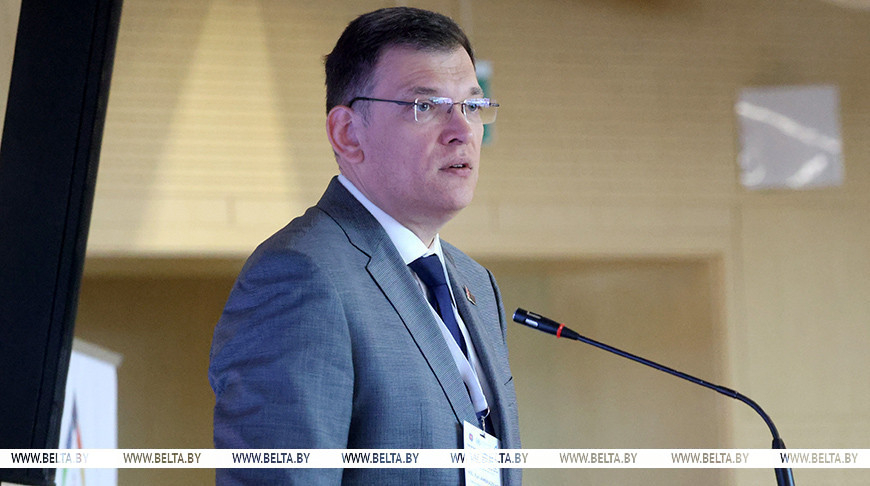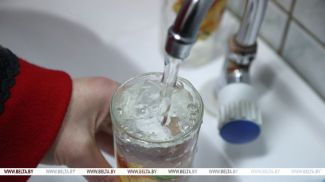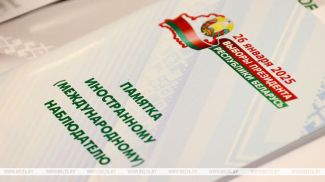
Yuri Ambrazevich
MINSK, 6 June (BelTA) – A decrease in deliveries of Belarusian fertilizers to the world market and disruptions of traditional chains for delivering other Belarusian agricultural products have had a negative effect on the international food security situation. Belarusian Deputy Minister of Foreign Affairs Yuri Ambrazevich made the relevant statement as he delivered a speech during the international conference “Strengthening the capacity of the Republic of Belarus to achieve the Sustainable Development Goals: Strategies and partnerships in the context of modern challenges and climate agenda” in the China-Belarus industrial park Great Stone on 6 June, BelTA has learned.
Yuri Ambrazevich spoke at length about negative aspects of the efforts meant to reach the identified sustainable development goals. “The world should become free from military conflicts and unilateral coercive measures. Research data from a number of international bodies point to global negative consequences of the armed conflict in the immediate vicinity of our borders,” the deputy minister of foreign affairs said.
“A decrease in deliveries of Belarusian fertilizers to the world market and disruptions of traditional chains for delivering other Belarusian agricultural products worsen the international food security situation,” Yuri Ambrazevich stressed. “The number of people unable to procure food exceeded 3 billion last year. Potassium is one of the aces of the Belarusian mining industry, of our export. It is one of the three nutrients, which use is of crucial importance for maximizing the yield of agricultural crops.”
The official also pointed out that since February 2022 Lithuania has fully blocked the transit of Belarusian fertilizers at the national level. It was impossible to ship them by sea to Africa, Asia, and Latin America in that period.
“Analytical reports by the United Nations Organization’s Global Crisis Response Group on Food, Energy and Finance indicate that the loss of Belarusian fertilizers inflated prices for fertilizers faster than prices for food. Many farmers have had to reduce output because the fertilizers they needed cost more than the grain they sell,” he continued. “For instance, the price for potassium chloride hit a historic high of $1,200 per tonne in Brazil in 2022. International buyers of Brazilian agricultural products felt consequences of this shock for a long time.”
“Even now the situation contains risks of devastating consequences for chains of agricultural deliveries and food security all over the world,” the deputy minister of foreign affairs stressed. “Belarus’ share on the markets of potash fertilizers of Africa alone dropped from nearly 42% in 2022 when we shipped potassium to nearly 30 African countries to 2.8%. According to evaluations based on FAO data, nearly complete disappearance of Belarusian supplies from the list of potassium suppliers to Africa has resulted in a decrease in the yield of cereal crops in these countries in excess of 16%.”
Apart from that, costs of agricultural producers all over the world have increased by several times.
Consequences of the illegally introduced restrictions can be tracked in Europe as well, Yuri Ambrazevich said. For instance, on 19 July 2023 wheat prices increased by over 8% from the previous day to reach €253.75 per tonne. Meanwhile, corn prices rose by over 5% simultaneously.
Yuri Ambrazevich believes that such spikes during exchange trade are unprecedented in modern conditions.
“It is also necessary to bear in mind further expected increase in the world population. According to UN experts, the world population is expected to increase by nearly 2 billion people within the next 30 years: from 8 billion at present to nearly 9.7 billion in 2050. In view of the rising world population potassium consumption is expected to increase due to the reduction and impoverishment of arable land and due to rising disposable income in developing countries,” the Belarusian deputy minister of foreign affairs concluded.













